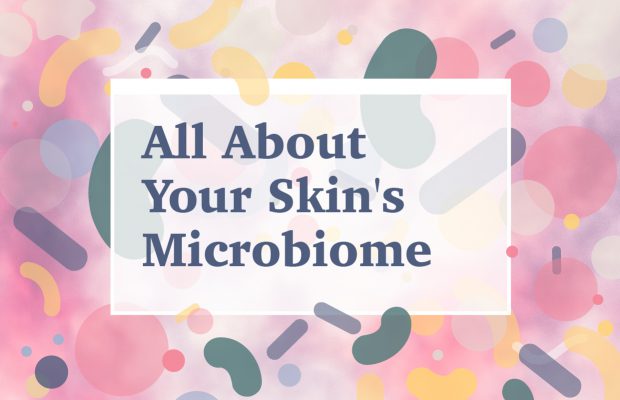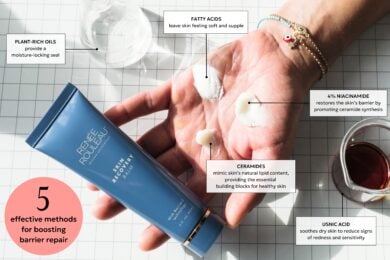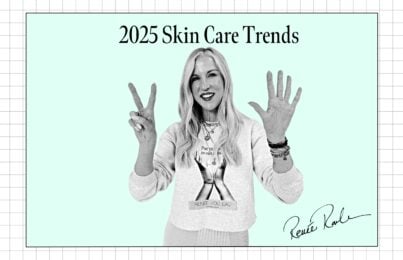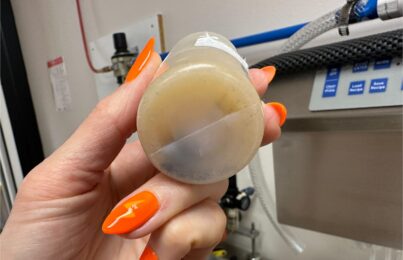Updated 07/05/23. When I wrote about the top skincare trends to look out for in 2020, I predicted a surge in products that affect the skin microbiome. Fast forward to today, and that “trend” is as relevant as ever. While many trends come and go (trust me, I’ve seen a lot in my 30 years as an esthetician!), I believe this one is a mainstay. Keep reading to learn everything you need to know about the skin microbiome, including how it impacts skin health, which skincare ingredients you can use to support it, and whether or not it can be affected by probiotic supplements.
(Note: This is something that’s continually being studied, so more information will certainly become available as time goes on.)
What Is the Microbiome and How Does It Impact the Skin?
When you think of the word “microbiome,” you probably think of the gut microbiome and the ways in which it’s thought to affect our health. Did you know that the surface of the skin is home to an equally diverse array of microorganisms? Most of these microorganisms are bacteria, but you can also find yeast and other fungi, viruses, and mites. Together, these microorganisms live in harmony to form our skin microbiome. It’s the first line of defense against environmental aggressors, toxic substances, and harmful organisms.
While we all share certain similarities when it comes to our skin flora, each person’s exact makeup is unique—so unique that the human microbiome is actually an emerging tool in forensics. The microbes you leave behind are as distinct as a fingerprint and can theoretically be cross-referenced with DNA to identify a suspect. How cool is that?
Despite all this ongoing research, there’s still a lot we don’t understand about the skin microbiome. What we do know is that it has a big effect on our overall skin health. At this point, it’s thought to play a role in inflammatory skin disorders such as acne, rosacea, eczema, and psoriasis. This is because our skin microbiota plays a crucial role in the functioning of our skin’s immune system and moisture barrier. Unfortunately, there’s a lot that can cause an imbalance in our skin microbiome, from harsh cleansing to some of the chemicals in our products.
Here are a few ways an unbalanced microbiome can affect our skin.
Inflammatory Skin Diseases (Acne, Rosacea, Eczema, Psoriasis)
One thing researchers have begun to focus on is the connection between inflammatory skin diseases and an imbalance in the skin microbiome. It’s actually been shown that patients with conditions like acne and eczema have a less diverse microbiome than those without. In regards to rosacea, it’s thought that an imbalance in microbiota disrupts the skin’s immune function, leading to an increased inflammatory response (hence, the redness associated with rosacea).
C. acnes is a type of bacteria associated with acne, but did you know there are actually several different bacterial strains in this group? One of them is known to cause acne, but the multiple others are considered “good” bacteria that help the skin carry out necessary functions. The problem with traditional acne treatments like benzoyl peroxide is that they wipe out all bacteria on the surface of the skin, instead of targeting just one specific strain. We’re starting to realize that this scorched-earth technique may not be the best approach and could actually be harming acne-prone skin by throwing its microbiome out of whack.
Damaged Moisture Barrier
Since the microbiome is a layer between our skin and the outside world, it’s crucial in making our skin’s barrier whole. When we use products that are too harsh, we risk disrupting the skin microbiome and, therefore, our moisture barrier. If you do have a compromised moisture barrier, here’s how you can fix it—FAST.
5 skincare products that can disturb your microbiome:
- Facial cleansers (specifically sulfate-based cleansers that strip your skin)
- Toners (specifically those formulated with SD Alcohol or Denatured Alcohol. Be sure to use an alcohol-free toner, though!)
- Hydrogen peroxide
- Benzoyl peroxide
- Exfoliating acids
Simply put, products that are too harsh and stripping disrupt every aspect of your skin’s barrier. This is all the more reason to treat your skin gently by using “microbiome-friendly” products (this is a term you’ll be hearing more and more in the future).
Discoloration
There is also some evidence that certain microbes produce chemicals that can help brighten the skin by fading pigmentation, such as melasma. There is still a lot of research to be done here, but it is promising and I’m eager to see what comes of it.
What Skincare Ingredients Support the Microbiome, and Are They Effective?
Now that we know what an important role the microbiome plays in keeping our skin healthy, the next question is how do we support it through the products we use? Well, there are currently three ways to affect the microbiome through skincare.
Prebiotics
Prebiotics feed microbes and help them thrive—think of them as food for good bacteria! These include ingredients like seaweed, fatty acids, and polysaccharides. Prebiotics aren’t living organisms and therefore won’t be harmed by preservatives. This makes them a lot easier to formulate with. I chose to formulate the Rapid Response Detox Toner with a fermented polysaccharide because it’s a safe, stable way to positively affect the skin’s microbiome.
Probiotics
Probiotics are actual living bacteria. While research has shown that introducing microbes onto the skin can successfully alter the composition of the microbiome, this testing hasn’t been done in a medical setting. Formulating a cosmetic product that can sit on a shelf and successfully deliver live microbes onto the skin is much more challenging. Preservatives are needed to keep products stable and prevent the proliferation of harmful microbes. The problem is that we don’t have a preservative system sophisticated enough to differentiate between “good” and “bad” bacteria. This means that, for now, products that truly contain live bacteria likely don’t have a preservation system to kill bacteria and need to be refrigerated to avoid the growth of “bad” bacteria. I know some companies are marketing probiotic products claiming they don’t need to be refrigerated, but according to the FDA, 90 percent of these actually contain postbiotics instead (more on these shortly).
Another challenge is that, when it comes to the skin microbiome, it’s highly unlikely that a one-size-fits-all approach is effective. As I mentioned before, our skin flora is as unique as a fingerprint. One person may benefit from a certain strain of bacteria that could throw someone else’s microbiome off-balance. To make matters even more complicated, the skin microbiome isn’t uniform—the microorganisms on your face may differ from the microorganisms on your underarms, which may differ from the microorganisms on your feet.
In the future, I think we’ll see a rise in skincare products that target each person’s unique microbiome. We’re still a ways off from that, though. For now, using topical probiotics in skincare is mostly experimental (though it’s unlikely to cause harm).
Postbiotics
Postbiotics are essentially what remains after the microbes that are living on our skin die off. They release chemicals that can then be used to create proteins and sugars that help our skin cells thrive. The byproducts of living microbes can be used in skincare to benefit the skin by supporting a healthy microbiome.
Can Taking Probiotics Internally Help Your Skin?
I think it’s a great idea to take a probiotic supplement for overall health (I certainly do). However, bacteria that are good for your gastrointestinal health may not necessarily translate to good skin. Of course, everything in our bodies is connected, and caring for yourself internally is important for general skin health. That said, in my experience, I have found that what you do internally will help internally, and what you do topically will help topically.
I don’t believe you can take a probiotic and expect it to clear your acne any more than I believe a “clean” diet is the cure for acne. Now, don’t get me wrong, eating certain foods or having an imbalance in your gut microbiome may exacerbate acne, but I know so many people who have really healthy diets and still break out. I’ve also known people who eat a lot of unhealthy foods and never get blemishes. (On that note: greasy foods don’t cause acne, but these 11 things might.)
Another thing worth mentioning is that most probiotic supplements only contain a handful of bacterial strains. Since there are thousands of types of bacteria in our gut, researchers are questioning whether loading up on just a few strains could cause an imbalance and promote the proliferation of harmful strains in certain individuals.
So What’s the Bottom Line?
As far as our understanding of the human microbiome is concerned, we’ve only just started to scratch the surface. It’s become clear that our microbiome, both internal and external, plays an important role in our overall health and wellbeing. The implications of this are exciting and could lead to many groundbreaking advances in both medicine and skincare. While research regarding probiotics in skincare is very promising, we have a ways to go before we know how to properly formulate and target these products. For now, the topical use of probiotics is experimental. In the meantime, pre and postbiotics are a stable and effective way to positively affect the skin’s microbiome, so I suggest looking into them!
Next, learn all about slugging and whether or not it can repair your damaged moisture barrier.
Celebrity Esthetician & Skincare Expert
As an esthetician trained in cosmetic chemistry, Renée Rouleau has spent 35 years researching skin, educating her audience, and building an award-winning line of products. Her hands-on experience as an esthetician and trusted skin care expert has created a real-world solution — products that are formulated for nine different types of skin so your face will get exactly what it needs to look and feel its best. Trusted by celebrities, editors, bloggers, and skincare obsessives around the globe, her vast real-world knowledge and constant research are why Marie Claire calls her “the most passionate skin practitioner we know.”



